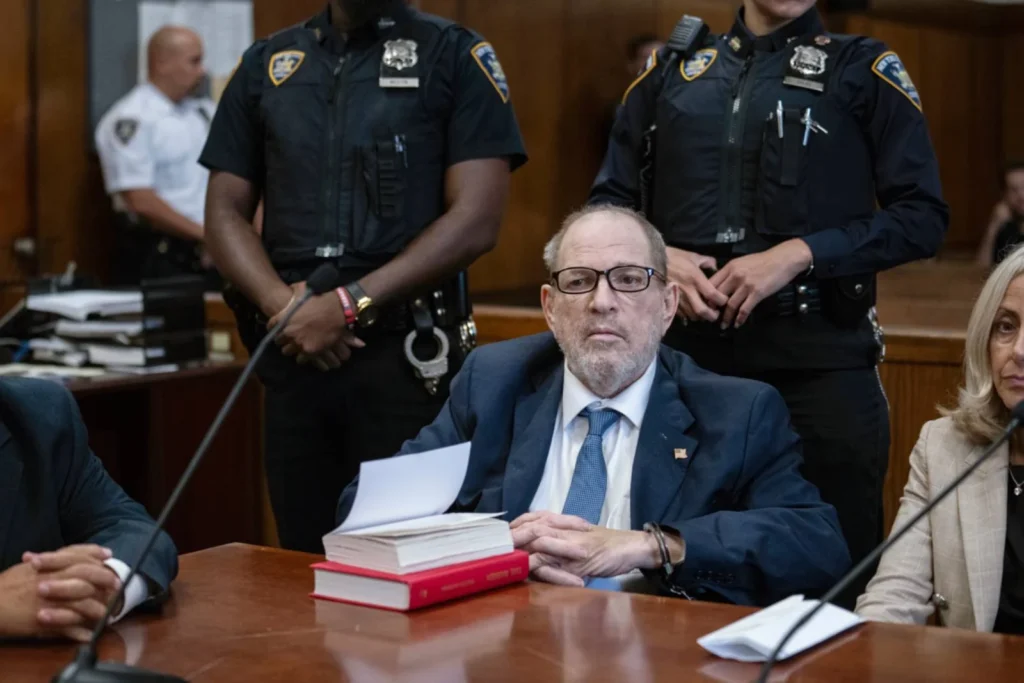Harvey Weinstein is a name that has become synonymous with both Hollywood’s creative brilliance and its darkest secrets. Once a titan in the film industry, his fall from grace has revealed deep-rooted issues of power, privilege, and abuse. This article will explore the life and career of Harvey Weinstein, examining his impact on the film industry, the allegations against him, and the broader cultural shifts that have followed in the wake of his scandal.

Early Life and Career
Harvey Weinstein was born on March 19, 1952, in Flushing, Queens, New York. He grew up in a Jewish family, the second of three sons. From an early age, Weinstein displayed a keen interest in the arts, particularly film. After graduating from the State University of New York at Buffalo, he and his brother, Bob, started a small production company called Miramax in 1979.
Miramax quickly gained recognition for its ability to produce and distribute independent films. The company achieved critical success with films like Sex, Lies, and Videotape (1989) and Pulp Fiction (1994), the latter winning the Palme d’Or at the Cannes Film Festival. Under Harvey’s leadership, Miramax became known for its aggressive Oscar campaigning, winning numerous Academy Awards and solidifying Weinstein’s status as a powerful player in Hollywood.
The Rise and Fall
As Weinstein’s power grew, so did his reputation for being a shrewd and often ruthless businessman. He was known for his ability to spot talent and make a hit film, but also for his volatile personality and aggressive tactics. Many in the industry both respected and feared him, often viewing him as a gatekeeper to success.
However, beneath the surface of Hollywood glamor lay a darker reality. Over the years, numerous allegations of sexual harassment and assault began to surface against Weinstein. Many women in the industry came forward, describing experiences of intimidation, coercion, and assault. The allegations were often dismissed or silenced due to Weinstein’s influence, leading many victims to suffer in silence.
The Breaking Point
The #MeToo movement, which gained momentum in late 2017, provided a platform for these voices to be heard. The initial spark came from a New York Times article that detailed multiple allegations against Weinstein. This exposé ignited outrage, leading to a tidal wave of accusations from women across various industries.
Weinstein was accused of using his power to manipulate and abuse women, creating a toxic environment that enabled his predatory behavior. As more women spoke out, the narrative surrounding Weinstein shifted from that of a celebrated producer to a pariah. High-profile actresses, including Gwyneth Paltrow, Angelina Jolie, and Mira Sorvino, shared their stories, revealing a disturbing pattern of misconduct.
Legal Battles and Conviction
In May 2018, Harvey Weinstein was arrested and charged with rape, criminal sexual act, sex abuse, and sexual misconduct. His trial began in January 2020, during which many survivors took the stand to share their harrowing experiences. The trial was a media sensation, capturing public attention and reigniting discussions about power dynamics in Hollywood.
In February 2020, Weinstein was found guilty of rape and sexual assault. He was sentenced to 23 years in prison, a decision that many saw as a significant step toward accountability in a culture that had long protected powerful men. However, Weinstein’s legal troubles didn’t end there; he faced additional charges in California and continued to appeal his convictions.
Cultural Impact
The fallout from the Harvey Weinstein scandal has been profound. It sparked a global movement, encouraging countless individuals to come forward with their own stories of abuse and harassment. The #MeToo movement transcended Hollywood, influencing workplaces, educational institutions, and beyond, pushing for systemic change and greater accountability for abusers.
The scandal also prompted Hollywood to reevaluate its practices, with many organizations implementing stricter policies regarding harassment and creating safer environments for women. Conversations about consent, power dynamics, and gender equality have become more mainstream, challenging the status quo in ways that were previously unimaginable.
A Cautionary Tale
Harvey Weinstein’s story serves as both a cautionary tale and a catalyst for change. It highlights the dangers of unchecked power and the culture of silence that often surrounds those in positions of authority. His downfall has forced society to confront uncomfortable truths about gender, power, and the systemic issues that allow abuse to flourish.
While Weinstein’s conviction was a significant moment in the fight against sexual violence, it also underscores the work that remains to be done. Many victims continue to face challenges in their pursuit of justice, and the conversation surrounding harassment and abuse must persist.
Conclusion:
Harvey Weinstein’s legacy is a complex one, marked by both his contributions to the film industry and the horrific abuses he perpetrated. As a once-respected figure turned convicted felon, he embodies the urgent need for societal change regarding power dynamics and accountability. The revelations surrounding Harvey Weinstein have sparked critical conversations that extend beyond Hollywood, advocating for a future where victims are heard, supported, and believed. His story serves as a reminder that change is possible, but it requires continued vigilance and commitment to addressing the roots of abuse.









































